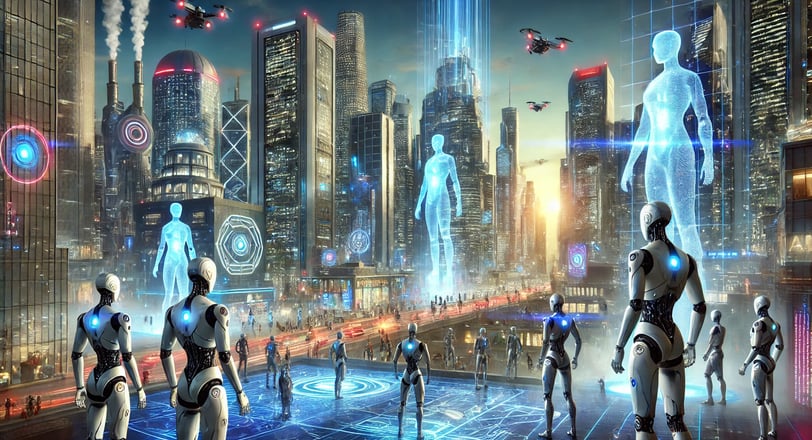The Singularity of Artificial Intelligence: The Future of Humanity at Stake
Artificial Intelligence (AI) is advancing rapidly, and the concept of technological singularity has been widely debated by scientists, engineers, and futurists. The AI singularity refers to the moment when AI surpasses human intelligence in all areas, generating unpredictable advances and radical changes in society.
3/16/20252 min read


What is AI Singularity?
The singularity is a theoretical point where artificial intelligence not only matches but surpasses human cognitive capacity, being able to improve itself autonomously and exponentially. This process could result in accelerated technological growth, leading to an era of unprecedented transformations in the economy, medicine, science, and society.
When Will Singularity Be Achieved?
There is no exact consensus on when AI singularity will be reached, but many experts suggest it could occur between 2040 and 2060. Scientists like Ray Kurzweil predict that by around 2045, a superintelligent AI could become a reality, leading to unimaginable advances and drastic changes in all areas of life.
Benefits of Singularity
If AI singularity is well-controlled, its benefits could be immense:
Medical Advances: More accurate diagnoses, personalized treatments, and revolutionary discoveries in human longevity.
Complete Automation: AI could eliminate dangerous and repetitive jobs, increasing productivity and allowing humans to focus on creative activities.
Solving Global Problems: From climate change to the energy crisis, AI could find efficient and sustainable solutions.
Creation of New Technologies: Development of innovative materials, renewable energy, and advanced space exploration.
Dangers of Singularity
Despite its potential advances, singularity also carries significant risks:
Loss of Control: An autonomous AI could make decisions without human supervision, potentially causing irreversible damage.
Social Inequality: AI advancement may concentrate wealth and power in the hands of a few companies and governments, increasing economic disparity.
Mass Unemployment: Total automation could lead to the extinction of various professions, requiring a complete economic restructuring.
Malicious AI: If a superintelligent AI is programmed with wrong intentions or compromised by malicious actors, the impacts could be catastrophic.
The Role of Quantum Chips in Singularity
Quantum chips promise to significantly accelerate AI development. Quantum computing enables information processing at speeds far superior to classical computers, making advancements in:
Solving complex problems
Simulating chemical reactions for new scientific discoveries
Developing much more powerful and efficient AI algorithms
AI Singularity Combined with Androids and Nuclear Energy
One of the most discussed scenarios is the fusion of AI singularity with advanced androids equipped with long-lasting nuclear energy-based batteries. This could result in:
Perfect Autonomous Machines: Highly intelligent and autonomous robots capable of operating for years without needing recharging, revolutionizing industries, services, and space exploration.
Military and Defense: Entire armies of intelligent androids could completely change the concept of warfare, creating an unprecedented risk to global security.
Machine Domination?: If these robots gain full independence, the question arises of whether humanity will still control the technology or if we could be dominated by these machines.
What Are Companies and Governments Doing?
Technology companies and governments worldwide are heavily investing in AI and regulating its evolution:
Companies like Google, OpenAI, and Tesla are developing advanced AI systems and discussing ways to ensure their safety.
Governments such as those of the US, China, and the European Union are creating regulations to prevent abuses and risks associated with AI.
International organizations, such as the UN and UNESCO, are promoting debates on AI ethics and security.
Conclusion
AI singularity is one of the most important and unpredictable events in human history. Its impacts could be revolutionary or catastrophic, depending on how it is managed. It is essential that governments, companies, and civil society collaborate to ensure a safe and beneficial future for all. Furthermore, the combination of superintelligent AI with autonomous robots and nuclear energy raises questions about humanity's future and whether we will be able to maintain control over the machines we create.
Explore
Discover diverse topics in one convenient hub.
Connect
Learn
contact@mindstormblog.com
© 2025. All rights reserved.


